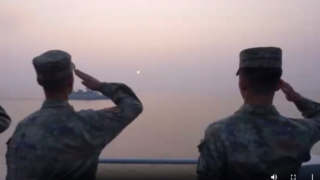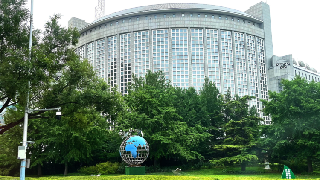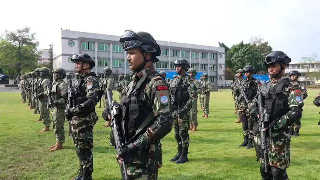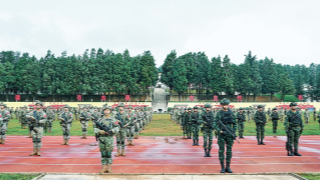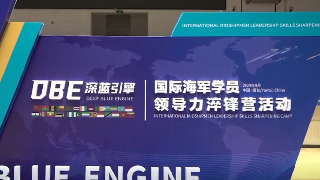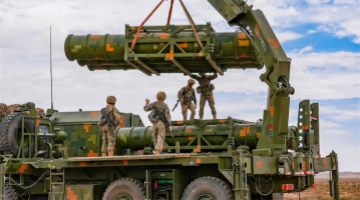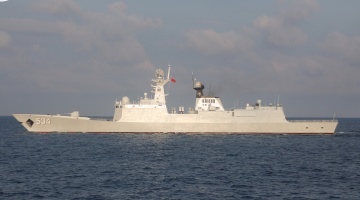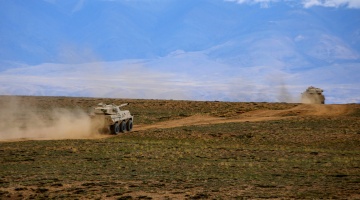By Yang Zhen
Security has increasingly become a core issue in international politics since the Ukraine crisis and the issue of nuclear security has risen to a new height since the Cold War.
Recently, Russian President Vladimir Putin chaired a permanent conference on nuclear deterrence, an annual event within the framework of the Security Council of Russia. The meeting primarily focused on updating the foundations of the country's nuclear deterrence policy. According to Putin, Russia has always been highly responsible in matters like nuclear weapons, striving to prevent the spread of nuclear weapons and their components. Russia's nuclear triad remains the most important security guarantee for Russia and an instrument for maintaining balance of forces in the world. In the updated version of Russia's nuclear doctrine, Russia expanded the scope of states and military alliances subject to nuclear deterrence measures. Aggression against Russia by any non-nuclear-weapon state, but with the participation or support of a nuclear-weapon state, is considered as a joint attack on Russia. Russia reserves the right to use nuclear weapons in the event of such aggression. Furthermore, if conventional weapons pose a serious threat to Russia's sovereignty, it will also be grounds for a nuclear response. Russia also reserves the right to use nuclear weapons in the event of aggression against Belarus as a member of the Union State.
Russia's actions are not isolated as NATO has also been active in the nuclear field. Recently, the Atlantic Council, a well-known think tank, called for NATO to adapt its nuclear sharing program, suggesting the deployment of B-61 nuclear bombs to Eastern Europe and the establishment of a network of intermediate-range missile bases across Europe. The think tank praised Washington's decision to send Tomahawk and SM-6 missiles to Germany as a "good start," and insisted that it "does not impose a high enough price" on Russia.
The US had deployed hundreds of new nuclear bombs at several air bases in Germany, the Netherlands, Belgium, Italy, and Türkiye as of last year. There are also reports that the US plans to redeploy nuclear weapons in the UK after a 15-year hiatus. Additionally, the topic of "extended deterrence" was discussed for the first time during the "2+2" talks between the foreign and defense ministers of Japan and the US this year. The US pledged to use military force, including nuclear weapons, to protect its allies.
The confrontation between Russia and NATO on nuclear security is bound to have serious consequences in the security field.
First, it will worsen the global security environment. As the large holders of nuclear arsenals, Russia and NATO are essentially in a spiral of confrontation. Given the high intensity of previous conflicts, there is now little room for compromise between the two sides.
Second, it will change the nature of nuclear weapons. Currently, the world is in the intermediate to advanced stages of informationized warfare. Emerging technologies such as artificial intelligence (AI) and big data are being increasingly applied to military fields. In particular, AI has significantly altered the face of warfare. The confrontation between the US and Russia in the nuclear field will likely lead to the application of emerging military technologies to nuclear weapons and fundamentally change its nature.
Third, it will further deteriorate the international nuclear arms control system. In recent years, the arms control mechanisms established during the Cold War have been continuously undermined. After the US withdrew from the Anti-Ballistic Missile Treaty and the Intermediate-Range Nuclear Forces Treaty, Russia announced in February 2023 that it would suspend its participation in the New Strategic Arms Reduction Treaty (New START) with the US, halting the sharing of nuclear weapon information. The US subsequently announced it would stop exchanging nuclear data with Russia as well. With the US and Russia holding over 90 percent of the world's nuclear weapons, their repeated breaches of agreements put the mutual supervision and transparency mechanisms in the nuclear arms control field at risk of collapse, which severely impacts the international arms control framework. The ongoing "nuclear confrontation" between the two will further damage this system.
(The author is deputy director of the Center for Northeast Asian Studies at Shanghai University of Political Science and Law.)
Editor's note: Originally published on china.com.cn, this article is translated from Chinese into English and edited by the China Military Online. The information and opinions in this article do not necessarily reflect the views of jmhuiquan.com.

